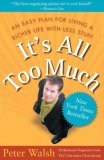July 12, 2008

… a private library is not an ego-boosting appendage, but a research tool. Read books are far less valuable than unread ones. The library should contain as much of what you do not know as your financial means, mortgage rates, and the currently tight real-estate market allow you to put there. You will accumulate more knowledge and more books as you grow older, and the growing number of unread books on the shelves will look at you menacingly. Indeed, the more you know, the larger the rows of unread books. Let us call this collection of unread books an antilibrary. (Nassim Nicholas Taleb, ‘The Black Swan: The Impact of the Highly Improbable,’ p. 1)
Indeed The Black Swan itself is part of my “antilibrary,” among the unread books that do seem menacing at times (or promising at others, or like sirens calling me away from whatever book I’m actually reading), but when I saw this quote at the interesting Total Library Project at SpaceCollective at least I had the book to refer to…
Comments (0)
- reading
July 8, 2008
Awhile ago I posted a list of cognitive science books for 2008, based on a search of Worldcat. The Library of Congress also has closely related headings for “cognitive psychology” and “cognition” — so below are selected “cognitive psychology” books, with “cognition” coming soon.
The LC scope note for “cognitive science”: “Here are entered works on the interdisciplinary study of the mind and computers as information processing systems.”
“Cognitive psychology”: “Here are entered works on the general approach to psychology that emphasizes the role of internal, mental processes in behavior.”
“Cognition”: “Here are entered works on mental processes in general.”
Cognitive psychology books 2008
Artificial Psychology: The Quest for What It Means to Be Human by Jay Friedenberg (Psychology Press, 2008)
Brain-Based Teaching for All Subjects: Patterns to Promote Learning by Madlon T Laster (Rowman & Littlefield Education, 2008)
Cognition and Emotion: From Order to Disorder by Michael J Power; Tim Dalgleish (Psychology Press, 2008)
Emotion Science: Cognitive and Neuroscientific Approaches to Understanding Human Emotions by Elaine Fox (Palgrave Macmillan, 2008) forthcoming
Music, Language, and the Brain by Aniruddh D Patel (Oxford University Press, 2008)
Social Cognition: Development, Neuroscience and Autism ed. by Tricia Striano and Vincent Reid (Wiley-Blackwell, 2008) forthcoming
Comments (0)
- cognitive science,new books
July 7, 2008

I know it sounds strange, but if you start by focusing on the clutter, you will never get organized. Getting truly organized is rarely about “the stuff.”
This is the bottom line: If your stuff and the way it is organized is getting you to your goals… fantastic. But if it’s impeding your vision for the the life you want, then why is it in your home? Why is it in your life? Why do you cling to it? For me, this is the only starting point in dealing with clutter.
(excerpt from It’s All Too Much)
When Kevin Kelly and Merlin Mann both rave about a book, it must be worth checking out, so as long as there’s still room to squeeze in one more book onto those overcrowded shelves, we’ll need to take a look at It’s All Too Much: How to Declutter Your Life by Peter Walsh.
Kevin Kelly’s Cool Tools review of ‘It’s All Too Much: How To Declutter Your Life‘ by Peter Walsh
Merlin Mann at 43folders: “My war on clutter” and “Review of It’s All Too Much…”
Peter Walsh interview at Unclutterer
Peter Walsh’s website
The Only 127 Things You Need: A Guide To Life’s Essentials, the book excerpted in a recent post here, includes advice on controlling clutter from Peter Walsh.
Walsh also appears on Clean Sweep cable TV program.
Comments (0)
- happiness,psychology
July 5, 2008

The Only 127 Things You Need: A Guide To Life’s Essentials by Donna Wilkinson (Tarcher/Penguin, 2008) lists the following essentials for a healthy mind, each further broken down into “essential components”:
- Love and connection: “the ability to form close bonds with others” and “the capacity to give and receive emotional support”
- A sense of control: “A strong belief in your own capabilities,” “resilience,” “optimism and humor,” and “a sense of purpose.”
- Mindfulness and acceptance: “the ability to be present,” “the ability to observe without judgment or criticism,” and “the capacity to notice new things.”
- The ability to be real: “honest self-reflection,” “the capacity to express and feel uncomfortable emotions,” “acceptance of self and others, warts and all,” and “the courage to live your own life.”
- Physical and mental exercise: “regular physical activity” plus “meditation and other mental exercise.”
(extracted from p. 245-308)
Comments (1)
- happiness,mind





